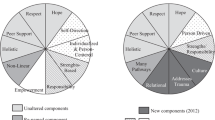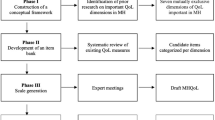Abstract
This paper addresses quality of post-acute care for older adults going home after hospitalization for depression. Quality was conceptualized and assessed in terms of services received for four domains of need: psychiatric, medical, functional, and psychosocial. At discharge, needs for care was assessed using medical records, standardized instruments, and patient interviews; quality of care was assessed by whether or not needs were met by services through the first 6 weeks of post-acute care. Quality of care varied across type of need: psychiatric needs were most likely, and psychosocial needs were least likely, to be met. Urban elders received better psychiatric care than did rural elders. Elders in worse physical health received better medical and psychosocial care, but poorer psychiatric care. Elders with psychoses and living with others had better care for functional dependencies. The competing demands perspective suggests that medical illness may take priority over psychiatric care.

Similar content being viewed by others
References
President's Advisory Commission on Consumer Protection and Quality in the Health Care Industry: Message from the Commission. Message from the Commission: Advisory commission's final report. Washington, DC; 1998.
Wang PS, Demler O, Kessler RC. Adequacy of treatment for serious mental illness in the United States. American Journal of Public Health. 2002;91(1):92–98.
Young AS, Sullivan G, Duan N. Patient, provider, and treatment factors associated with poor-quality care for schizophrenia. Mental Health Services Research. 1999;1(4):201–211.
Norquist G, Wells KB, Rogers WH, et al. Quality of care for depressed elderly patients hospitalized in the specialty psychiatric units or general medical wards. Archives of General Psychiatry. 1995;52(8):695–701.
Skinner E, Steinwachs DM, Handley K, et al. Met and unmet needs for assistance and quality of life for people with severe and persistent mental disorders. Mental Health Services Research. 1999;1(2):109–118.
Bartels SJ. Quality, costs, and effectiveness of services for older adults with mental disorders: a selective overview of recent advances in geriatric mental health services research. Current Opinion in Psychiatry. 2002;15(4):411–416.
Jeste DV, Alexopoulos, GS, Bartels SJ, et al. Consensus statement on the upcoming crisis in geriatric mental health. Archives of General Psychiatry. 1999;56(9):848–853.
Li H, Proctor E, Morrow-Howell N. Outpatient mental health service use by older adults after acute psychiatric hospitalization. Journal of Behavioral Health Services & Research. 2005;32:74–84.
Brown S. Variations in utilization and cost of inpatient psychiatric services among adults in Maryland. Psychiatric Services. 2001;52(6):841–843.
Burns BJ, Taube CA. Mental health services in general medical care and nursing homes. In: Fogel BS, Furino A, Gottlieb GL, eds. Protecting Minds at Risk. Washington, DC: American Psychiatric Press; 1990:63–84.
Shapiro S, Skinner EA, Kramer M, et al. Measuring need for mental health services in a general population. Medical Care. 1985;23(9):1033–1043.
Wagner DP, Knaus WA, Draper EA. Identification of low-risk monitor admissions to medical–surgical ICUs. Chest. 1987;92(3):423–428.
Colenda CC, Mickus MA, Marcus SC, et al. Comparison of adult and geriatric psychiatric practice patterns: Findings from the American Psychiatric Association's practice research network. American Journal of Geriatric Psychiatry. 2002;10(5):609–617.
Thienhaus OJ, Rowe C, Woellert P, et al. Geropsychiatric emergency services: Utilization and outcome predictors. Hospital & Community Psychiatry. 1988;39(12):1301–1305.
U.S. Department of Health and Human Services. Center for Disease Control and Prevention. Health, United States, 2002. With Chart book on Trends in the Health of Americans. Hyattsville, MD: National Center for Health Statistics; 2002.
Donner LL, Kopytko EE, McFolling SD, et al. Increasing psychiatric inpatients' community adjustment through therapeutic passes. Archives of Psychiatric Nursing. 1990;4(2):93–98.
Lave JR, Frank RG. Factors affecting Medicaid patients' length of stay in psychiatric units. Health Care Financing Review. 1988;10:57–65.
National Association of Psychiatric Health Systems. 1992 Annual Survey: Final Report. Washington, DC: National Association of Psychiatric Health Systems; 1993.
Morrow-Howell N, Proctor EK, Rubin E, et al. Service needs of depressed older adults following acute psychiatric care. Aging and Mental Health. 2000;4(4):330–338.
Regier DA, Narrow WE, Rae DS, et al. The de facto US mental and addictive disorders service system. Epidemiologic catchment area prospective 1-year prevalence rates of disorders and services. Archives of General Psychiatry. 1993;50(2):85–94.
U.S. Department of Health and Human Services. Mental health: Culture, race, and ethnicity—A supplement to mental health: a report of the Surgeon General. Rockville, MD: U.S. Department of Health and Human Services, Substance Abuse and Mental Health Services Administration, Center for Mental Health Services. 2001. Available at: www.surgeongeneral.gov/library/mentalhealth/cre/ Accessed September 10, 2002.
Morrow-Howell N, Proctor EK, Doré P, et al. Post acute services to older adults with heart disease. Journal of Applied Gerontology. 1998;17(2):150–171.
McGlynn EA. Six challenges in measuring the quality of health care. Health Affairs. 1997;16:7–21.
Donabedian A. The Definition of Quality and Approaches to its Assessment. Ann Arbor, MI: Health Administration Press; 1980.
Roth D, Crane-Ross D. Impact of services, met needs, and service empowerment on consumer outcomes. Mental Health Services Research. 2002;4(1):43–56.
Donabedian A. Criteria and standards for quality assessment and monitoring. Quality Review Bulletin. 1986;12:99–108.
Wolinsky FD. Health services utilization among older adults: conceptual, measurement, and modeling issues in secondary analysis. Gerontologist. 1994;34(4):470–475.
Andersen RM. Revising the behavioral mode and access to medical to medical care: does it matter? Journal of Health and Social Behavior. 1995;36(1):1–10.
George LK. Social factors and the onset and outcome of depression. Aging, health behaviors, and health outcomes. In: Schaie KW, House JS, Blazer DG, eds. Hillsdale, NJ: Lawrence Erbaum Associates; 1992.
Kemp B, Brummel-Smith K, Ramsdell JW. Geriatric Rehabilitation. Austin, TX: PRO-ED; 1990.
Lebowitz BD, Niederehe G. Concepts and issues in mental health and aging. In Birren J, Sloane R, Cohen G, eds. Handbook of Mental Health and Aging. San Diego, CA: Academic Press; 1992;3–26.
Ettner SL, Hermann RC. Inpatient psychiatric treatment of elderly Medicare beneficiaries. Psychiatric Services. 1998;49(9):1173–1179.
George LK, Blazer DG, Hughes DC, et al. Social support and the outcome of major depression. British Journal of Psychiatry. 1989;154:478–485.
Hinrichsen GA, Hernandez NA. Factors associated with recovery from and relapse into major depressive disorder in the elderly. American Journal of Psychiatry. 1993;150(12):1820–1825.
Dickey B, Hermann RC, Eisen SV. Assessing the quality of psychiatric care: Research methods and application in clinical practice. Harvard Review of Psychiatry. 1998;6:88–96.
Wang PS, Demler O, Kessler R. Adequacy of treatment for serious mental illness in the United States. American Journal of Public Health. 2002;92(1):92–98.
Proctor EK, Morrow-Howell N, Doré P, et al. Comorbid medical conditions among depressed elders discharged home after acute psychiatric care. American Journal of Geriatric Psychiatry. 2003;11(3):329–338.
Rozario P, Morrow-Howell N, Proctor E. Comparing the congruency of self-report and provider records of depressed elders' service use by provider type. Medical Care. 2004;42(10):952–959.
Folstein MF, Folstein SE, McHugh PR. Mini-mental state. A practical method for grading the cognitive state of patients for the clinician. Journal of Psychiatric Research. 1975;12(3):189–198.
Kane RA, Kane RL. Assessing the Elderly: A Practical Guide to Measurement. Lexington, MA: Heath; 1981.
Yesavage JA, Friedman L, Kraemer HC, et al. A follow-up study of actigraphic measures in home-residing Alzheimer's disease patients. Journal of Geriatric Psychiatry & Neurology. 1998;11(1):7–10.
Ware JE, Kosinsiki M, Keller SD. A 12-item short-form health survey: construction of scales and preliminary tests of reliability and validity. Medical Care. 1996;34(3):220–233.
Miller MD, Paradis CF, Houck PR, et al. Rating chronic medical illness burden in geropsychiatric practice and research: application of the cumulative illness rating scale. Psychiatry Research. 1992;41:237–248.
Duke University Center for the Study of Aging and Human Development. Multidimensional functional assessment: The OARS Methodology. Durham: The Center for the Study of Aging and Human Development, Duke University Medical School; 1978.
Yesavage JA. The use of self-rating depression scales in the elderly. In: Poon L, Crook T, Davis K, Eisdorfer B, Gurland BJ, Kasniak A, Thompson LW, eds. Handbook for Clinical Memory Assessment of Older Adults. Washington, DC: American Psychological Association; 1986.
Lyons JS, Strain JJ, Hammer JS., et al. Reliability, validity, and temporal stability of the Geriatric Depression Scale in hospitalized elderly. International Journal of Psychiatry in Medicine. 1989;19(2):203–209.
Norris J, Gallagher D, Wilson A, et al. Assessment of depression in geriatric medical outpatients: The validity of two screening measures. Journal of the American Geriatrics Society. 1987;35(11):989–995.
Kotz S, Johnson N, Read CB, eds. Encyclopedia of Statistical Sciences. New York: Wiley Publications; 1982;2:298–5195.
Draper BM. The effectiveness of the treatment of depression in the physically ill elderly. Aging & Mental Health. 2000;4(1):9–20.
Klinkman MS. Competing demands in psychosocial care. A model for the identification and treatment of depressive disorders in primary care. General Hospital Psychiatry. 1997;19(2):98–111.
Fillenbaum GG, Smyer M. The development, validity, and reliability of the OARS multidimensional functional assessment questionnaire. Journal of Gerontology. 1981;36:428–434.
Acknowledgments
The preparation of this article was supported by the Center for Mental Health Services Research, George Warren Brown School of Social Work, Washington University in St. Louis, through an award from the National Institute of Mental Health (#5R24MH50857-04).
Author information
Authors and Affiliations
Corresponding author
Additional information
Nancy Morrow-Howell, PhD, George Warren Brown School Social Work, Washington University, One Brookings Drive, St. Louis, MO 63130, USA.
Mi Jin Lee, MSW, George Warren Brown School Social Work, Washington University, One Brookings Drive, St. Louis, MO 63130, USA.
Jessica Gledhill, MSW, Family and Children Services, 650 South Peoria, Tulsa, OK 74120, USA.
Wayne Blinne, MA, George Warren Brown School Social Work, Washington University, One Brookings Drive, St. Louis, MO 63130, USA.
Rights and permissions
About this article
Cite this article
Proctor, E., Morrow-Howell, N., Lee, M.J. et al. Quality of Care for Depressed Elders in Post-Acute Care: Variations in Needs Met Through Services. JBHSR 33, 127–141 (2006). https://doi.org/10.1007/s11414-006-9017-3
Published:
Issue Date:
DOI: https://doi.org/10.1007/s11414-006-9017-3




